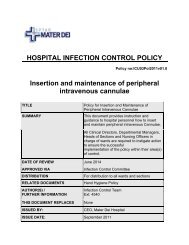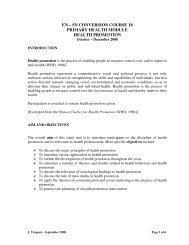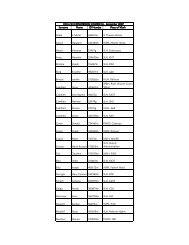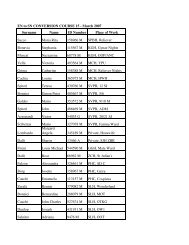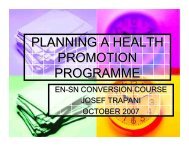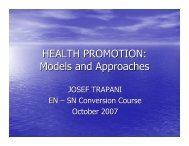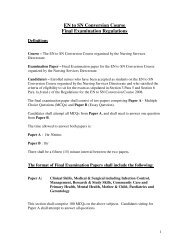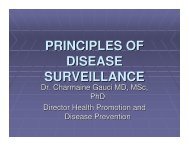Reflective_Practice_.. - Vince Saliba
Reflective_Practice_.. - Vince Saliba
Reflective_Practice_.. - Vince Saliba
Create successful ePaper yourself
Turn your PDF publications into a flip-book with our unique Google optimized e-Paper software.
Important<br />
EN to SN Conversion Course<br />
Professional Development Module<br />
Intake 19<br />
Individual assignment for assessment of second semester is to be handed in by<br />
the end of the second Month of the Third semester (30 th April 2010 - word limit<br />
between 1,500 and 2,000 words).<br />
Describe an experience/critical incident drawn from your clinical practice. Take time to<br />
consider and reflect upon the influencing factors of this experience. Keeping in mind the<br />
requisites for reflection, write an assignment which shows the utilization of reflective<br />
practice as a source for self-criticism and expansion of personal knowledge to improve<br />
patient care holistically.<br />
Guidelines on how you should go about your assignment:<br />
You are advised to read the handouts on reflective practice given to you by your lecturer<br />
on the topic. Extra reading and research is expected to support your arguments. In your<br />
own personal experience and based on what you will read on reflective practice, you<br />
think of a significant experience that illustrates when you got stuck or did not consider<br />
the experience as ‘desirable’ practice. You describe your own experience and then you<br />
have to reflect upon the influencing factors of this experience to be able to discuss what<br />
was learned to improve patient care.<br />
Lecturer: Mr Ray Grixti<br />
Subject co-ordinators: Miss. Marisa Vella & Ms. Maria Sciberras<br />
Emails: marisa.l.vella@gov.mt<br />
maria.sciberras@gov.mt
Guidelines to help you through the reflective process in order to work on your<br />
assignment<br />
Identifying the experience<br />
The first step in the reflective process is to identify an incident or experience of some<br />
kind that you feel you could benefit from reflecting on. This is called a ‘critical incident’.<br />
The intention is not to identify incompetent practice, but to provide a ‘snapshot’ of<br />
practice at a key moment in order to promote the nurse’s learning and professional<br />
development. The incident you choose to focus on does not have to be a major disaster.<br />
A Critical Incident or a Significant could be:<br />
• An incident in which you feel your intervention would or have really made a<br />
difference to the care of the patient or client<br />
• An incident that did not go well even though you had expected to<br />
• An incident that highlights the ‘ordinary and everyday’ practice of nursing or your<br />
role<br />
• An incident that you feel highlight ‘what nursing is all about’<br />
• An incident that was particularly demanding and stretched your skills as a nurse.<br />
Describing the Experience<br />
It seems self-evident that the next step needs to be a description of the incident. However,<br />
this can be more difficult than it would seem because of the ‘taken for granted’ nature of<br />
much of nursing practice, so it is important to be clear about the relevant details of the<br />
event. The following points are a useful guide:<br />
• The context: time of the day, where it took place, the staff involved, details<br />
about the patient/client, protocols or policies of the unit/hospital<br />
• What happened: break the incident down into each of its stages; describe in<br />
detail what occurred step by step, giving an indication of the timescale as well as<br />
the specific actions taken by you and others.<br />
Avoid giving any interpretation or rationale at this point; focus on giving as objective<br />
an account of the facts as you can.
Analyzing the Incident<br />
Try to follow the method of reflecting ‘on’ and ‘in’ practice as the lecturer has indicated<br />
to you during his lectures.<br />
There are different approaches for analyzing and commenting on the critical incident.<br />
However, whatever approach you adopt, or adapt, the following are the kind of cue<br />
questions you might like to consider:<br />
• Why is this incident significant to you? Does it, for example, raise questions that<br />
perplex you?<br />
• How did the environment, including other people, contribute to this incident?<br />
• What were you trying to achieve and how did events affect your goals?<br />
• What were your feelings while the incident was taking place and what were they<br />
now as you reflect on the events?<br />
• What knowledge did you have available and how did you use it? Does the<br />
incident highlight a gap in you knowledge or skills?<br />
• I what way did your values, beliefs or assumptions affect the way you acted? Is<br />
there any contradiction between the values and beliefs you hold and what you<br />
actually did or said?<br />
• What might other people, such as the patient or client, have been feeling and how<br />
might this have affected the situation?<br />
• How did you make your decisions? What were the cues that prompted you to act<br />
in the way you did?<br />
• Have you examined all the salient features of the experience?<br />
• How would you do things differently now? What new insights have you<br />
developed?<br />
• What were your goals or resolutions for the future? How will this incident change<br />
your future actions?<br />
Remember that when examining and discussing the salient features or areas such as<br />
knowledge, beliefs, values and decision, depending on your incident, if you decide that<br />
you need to develop further your knowledge or skills, you have to support your discussion<br />
on these issues with literature review/research.






